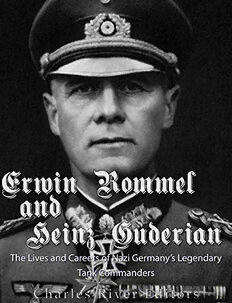
Erwin Rommel and Heinz Guderian: The Lives and Careers of Nazi Germany’s Legendary Tank Commanders PDF
02018·2.622 MB·English
Most books are stored in the elastic cloud where traffic is expensive. For this reason, we have a limit on daily download.
Preview Erwin Rommel and Heinz Guderian: The Lives and Careers of Nazi Germany’s Legendary Tank Commanders
Description:
*Includes pictures*Includes quotes about their lives and careers*Includes a bibliography for further reading*Includes a table of contentsOne of his biographers called him “a complex man: a born leader, a brilliant soldier, a devoted husband, a proud father; intelligent, instinctive, brave, compassionate, vain, egotistical, and arrogant.” As that description suggests, every account of Erwin Rommel’s life must address what appears to be its inherent contradictions. Fittingly, and in the same vein, he remains one of the best remembered generals of World War II and history at large, despite the fact he was on the losing side, and he was defeated at the most famous battle of his career, the decisive Battle of El Alamein. Nonetheless, the Desert Fox has been a legend on both sides of the Atlantic for over 70 years, thanks to the crucial role he played in history’s deadliest conflict. Before his legendary encounters against the British and Americans in North Africa, Rommel gained much fame for his role in the invasions of Poland and France before was sent to North Africa in February 1941. In describing Rommel, the Italian officer Alessandro Predieri talked about his “two very rare and precious gifts”: “The first is luck, which you will remember, Napoleon prescribed to his generals…The second gift is that of being able to keep his bearings in the midst of all the confusion of modern desert warfare. His instinct tells him immediately where a difficult situation is going to develop, and off he goes with his Kampfstaffel [Headquarters Group], which he treats like a Praetorian Guard, and puts things right, charging around like a junior officer.” After leaving North Africa, Rommel spent much of the later part of the war strengthening German defenses across the Atlantic in anticipation of an amphibious Allied landing, which would come in June 1944. But the murky role he played in the notorious July 20 plot on Adolf Hitler’s life in 1944, the closest an assassination attempt got to killing the Nazi Fuhrer, would bring about the Desert Fox’s untimely demise in October 1944, even as the Soviets and Western Allies were tightening the vise on Germany. Compelled to take cyanide by authorities, the Desert Fox insisted he was innocent until his dying day, and his popularity forced the Nazi government to claim his death was brought about by a heart attack or a cerebral embolism. In fact, Rommel was given an official state funeral, and Winston Churchill would go on to praise him, “He also deserves our respect because, although a loyal German soldier, he came to hate Hitler and all his works, and took part in the conspiracy to rescue Germany by displacing the maniac and tyrant. For this, he paid the forfeit of his life. In the sombre wars of modern democracy, chivalry finds no place … Still, I do not regret or retract the tribute I paid to Rommel, unfashionable though it was judged.” Heinz Wilhelm Guderian was one of the most respected commanders and theoreticians of World War II. An innovative tank commander, he was a pioneer of German Blitzkrieg tactics and therefore, a hugely influential figure in the way the war was fought. Guderian's profile was not always what might have been expected for a man of his abilities and influence warrant due to the shape of his career. As a German commander during the war, Guderian fought for one of the most appalling regimes in history, so while his skills are respected, it is hard to celebrate a man who led the troops of the Reich, especially to such success. Erwin Rommel, the legendary Desert Fox, managed to somewhat sidestep this stigma through his glamour and remarkable achievements spanning the length of the war, but Guderian was out of power for over a year, and when he returned, it was not to a position of battlefield command, giving him fewer opportunities than Rommel to build his reputation in the eyes of the Western media.
See more
The list of books you might like
Most books are stored in the elastic cloud where traffic is expensive. For this reason, we have a limit on daily download.
